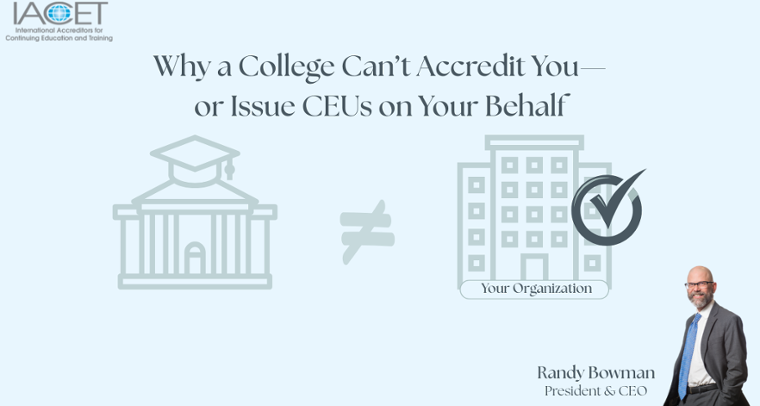Why a College Can't Accredit You--or Issue CEUs on Your Behalf

I was once on a call with a training organization interested in IACET accreditation when they said, “We don’t need it; we’re accredited through our partner university.” Another time, a provider confidently stated, “We have a college issue CEUs for us.”
These aren’t rare statements. And while I understand where they come from, they reflect a fundamental misunderstanding of how accreditation works and how Continuing Education Units (CEUs) gain credibility.
Let’s be clear: A college cannot accredit your organization. And unless that college is the direct provider of the training, it cannot issue CEUs on your behalf in any meaningful, recognized way.
A College’s Accreditation Doesn’t Extend to You
Most colleges and universities in the U.S. are accredited by regional accrediting bodies, like the Higher Learning Commission (HLC) or Middle States Commission on Higher Education. That accreditation is rigorous and meaningful…for academic credit-bearing programs.
But here’s the key point: Regional accreditation does not extend to the college’s non-credit activities, nor to other organizations with which it collaborates.
If a college collaborates with your organization to co-develop training or lends its name to your certificate, that may be a helpful partnership, but it’s not accreditation. Your organization has not been reviewed. Your policies, processes, and instructional design have not been audited. There’s been no third-party assurance of quality.
Accreditation is institutional. It cannot be loaned, delegated, or transferred.
CEUs Aren’t Just About the Certificate—They’re About the Process
Some organizations try to shortcut the system by having a college “issue” the CEUs. That might make the certificate look impressive, but it won’t stand up to scrutiny if:
- You’re audited by a licensure board
- You apply for government funding
- Your learners need to submit CEUs for a professional credential
Why? Because the CEU isn’t about the certificate; it’s about the learning experience and the quality assurance behind it.
Unless the college is:
- Designing the instruction,
- Verifying attendance and participation,
- Conducting the evaluation,
- And maintaining the learner records,
…it is not the CEU provider. You are.
Unless you are accredited to issue CEUs under a recognized standard (like the ANSI/IACET 1-2018 Standard), those CEUs may not be valid when and where it counts.
Many Colleges Aren’t IACET Accredited
It’s also worth noting that many colleges are not accredited CEU providers. While they may offer non-credit courses and call them CEUs, those CEUs are often not issued under a consistent or externally validated standard.
So, if your organization is relying on a college to “add legitimacy” to your CEUs, you may be depending on a system that lacks the very rigor you’re hoping to borrow.
Partnerships Are Not a Substitute for Accountability
Let’s be real: partnerships with colleges can be wonderful. They can offer:
- Subject matter expertise
- Faculty for instruction
- Access to facilities or platforms
- Name recognition
What they cannot offer is an umbrella of accreditation over your organization.
If your organization delivers the learning, your organization needs to own the quality. Accreditation means you’ve demonstrated a commitment to consistent, high-quality processes and that you’re accountable for them.
It’s not something you can outsource. It’s something you earn.
Final Thoughts
When someone tells me their CEUs are valid because a college was involved, I ask: “Who designed the course? Who evaluated the outcomes? Who keeps the records? Who ensures quality?”
If the answer is your organization, then you need to be accredited, not the college.
Don’t mistake collaboration for compliance. If you want your CEUs to count, make sure the right provider is accredited—and that provider is you.
About the Author

Randy is a seasoned executive leader currently serving as the President and CEO of IACET, a non-profit accrediting body in the continuing education and training sector. With a focus on strategic vision and operational excellence, he effectively leads the organization to achieve its mission and goals.
With over two decades of experience in various leadership roles, Randy has a proven track record of driving organizational success. His expertise lies in aligning technological solutions with strategic objectives, ensuring operational efficiency and sustainable growth.
